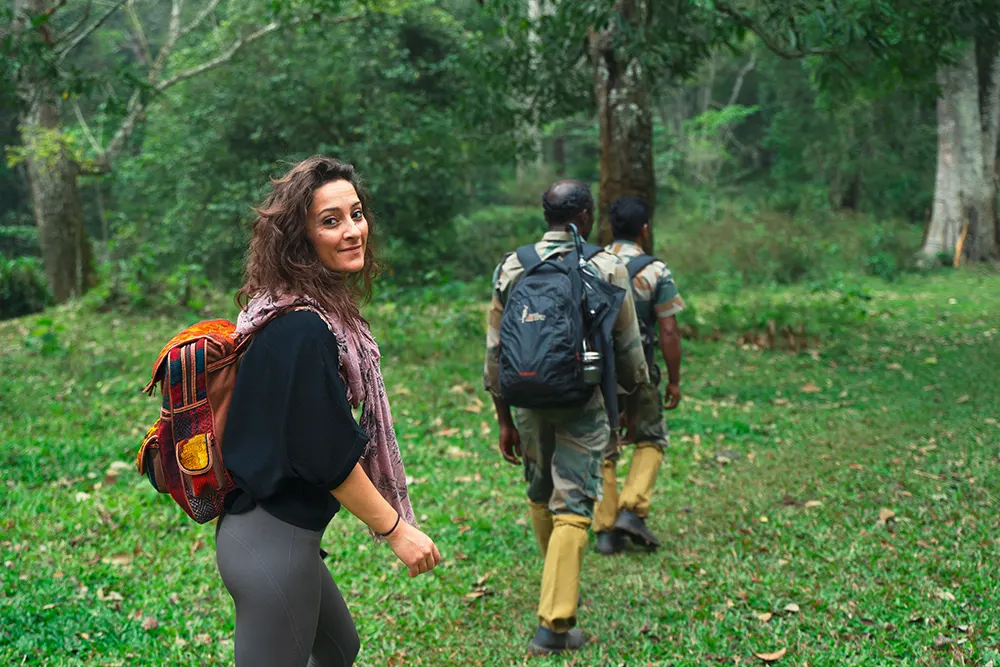When traveling alone in a country with a culture that is very different from your own, the risk of being intimidated by the idea of culture shock is high. Furthermore, depending on one's destination, the more or less superficial news one has about a place or a people and its habits help to increase the sense of fear which can even dissuade one from traveling.
Of course, everything we know (or think we know) and/or read before leaving cannot be compared to a direct experience in which everything that seemed to be black or white magically becomes a large scale of gray
Am I leaving or not?
Direct experience may not always be the solution. There are places in the world which, unfortunately for us passionate travellers, could be considered off-limits, although some courageous people are not intimidated by anything. Wars, terrorism and crime, among other reasons, are some of the causes that could make us opt for another destination. Sometimes, however, even in the absence of wars or other strong dissuaders, the information we have about some countries seems to lead in that same direction. Several times it happened to me that I had to deny (or confirm) what I read, before leaving on a trip, with direct experience.
Of course, we must not forget that fear is a fundamental emotion for self-preservation and, as such, it should be thanked because it helps, except in its excesses, to face any situation with maximum concentration and leads to gather as much information as possible about a place, before even visiting it

The thought of others
It has happened to me several times that, announcing my next trip to friends, relatives or acquaintances, they widened their eyes in disbelief. I have been called "brave", when I was luckier, "reckless" and, in the most extreme cases, they tried to make me think about a change of destination. What my interlocutors weren't aware of, however, was the immense amount of information I had already assimilated when I communicated my intention to leave. At this point it is good to remind yourself that, except in rare exceptions, the thinking of these people is dictated more by prejudice than by real information. To verify the reliability of their opinions, it is often enough to start a simple conversation about the problems or alleged problems of a country, to see, thanks to our knowledge, where theirs stop, if it ever begins.
The role of generalist information
The goal of newscasts and newspapers is almost always to report news events at levels ranging from local to international. Leaving aside the too complex topic of how much the vision of the various directors can be vitiated by personal ethical and political positions, it is however extremely rare to see news with a positive or inspiring content on our screens or in the pages of the newspapers. Consequently, if the information we have about another country is only what we have acquired from these media, it should not surprise us if the idea we have of a people is clearly negative. On what occasions, in the West, do we hear about peoples of the Muslim faith, for example? Are these not situations in which acts of terrorism, wars or religious fanaticism are spoken of? How many states in Central and South America appear to be, in European eyes, only the seat of political instability, popular insurrections, when not of kidnappings and robberies against tourists? How many times, speaking of South-East Asia, do the terms "pollution", "garbage", "poor sanitation", "dysentery" come up? Finally, how many peoples with so much history and very complex cultures are represented by the single flag with the colors of poverty? According to these arguments, it would seem that the poor country is not worthy of being visited, that the hungry people are not worthy of being known because, fundamentally, poverty scares us and fear blinds us, preventing us from seeing everything else.
Regardless of the country you are from, leafing through a history book, you will be able to find at least a few pages that tell of your own country in the throes of wars, poverty, disease, etc. It doesn't seem that the history before or after those nefarious events and your culture have been erased by an epidemic or by the shelling of tanks...
Romania was scary
When, in 2012, I decided to go on a trip to Romania and Bulgaria, together with some friends, the reactions to the news of our departure ranged from "what are you going to do there?" to a series of advice on how to avoid dangers that the speaker, in his life, had never faced, neither there nor elsewhere. Of course, because the name "Romania" has been too often and too superficially associated with the term "Rom" and therefore with those people who "annoyed us, on the subway, during our weekend in Rome". If this was the idea that some had of neighboring Romania, just 11 years ago, think of the ideas that one can have of countries even more distant and different from ours! The proximity of the Eastern European countries, the mobility facilitated by low-cost airlines, the work on tourist reception made by the individual states, a new curious and traveling generation, as well as many other factors, have made these countries very popular tourist destinations about which even the most narrow-minded provincialism, today, finds not much to say about. For example, Albania, sadly in the headlines about 30 years ago, due to internal problems that drove its people on boats of hope, is today one of the most important destinations in the dental tourism (and not only) in Europe. I myself, in 2022, had an experience in this sense (I talk about it in this article).
So many other places are scary
Between 2021 and 2023, I made three of the most exciting trips of my life to Jordan, Morocco and India (which I talk about extensively in several articles of this blog that I invite you to read). What made them so significant, in addition to the attractiveness of places and cultures, was precisely that cultural shock that frightens many. So...
the journey, in this sense, is made even more precious by the "distance" of one's own culture from that of the country in which one is a guest, an added value to the usual scenic, historical, culinary and cultural attractions, because it stimulates not only the 5 senses but also the our ability to adapt, our propensity to step out of the comfort zone
In any case, before traveling far and wide in those three countries, I informed myself intensely by watching videos, reading article after article and printed guides. The information on the net is endless for any destination and, sometimes, based on the experience of those who write the articles, one can get discouraged.
What should you read?
The advice I can give you is to read as much as possible, from blogs to guides and official online channels of the countries you want to visit, trying to maintain a high level of objectivity and not stopping at articles that seem to satisfy your desire to leave or your fears. If you are intimidated by the idea that it is dangerous to go to Morocco and you come across an article that tells you how two Scandinavian tourists, in 2018, were kidnapped and beheaded during a trek on Mount Toubkal (an experience I had, two years and half after the fact), there's a good chance your fear will grow further and drive you to look away. Similarly, if your instinct prompts you to leave for a country and you come across an article which, perhaps superficially, tells you that there is nothing to fear, the risk you run is of having no defenses, of not being prepared for that unexpected event which, remember, can happen anywhere.
You don't have to convince your family that the wisest idea is to leave and settle for that article that would prove it. You will then undertake the journey and the less prepared you are, the more exposed you will be
The risks of mismanaging fear
Whether you dismiss a serious situation or let yourself be overwhelmed by fear, you could find yourself defeated, in both cases. A person close to me, a person I respect and to whom I would literally entrust my life, ran into a trivial mistake during a trip that he would never have made at home. In his case, the idea of ??being abroad (an experience he wasn't particularly used to) and of not knowing the language of the place where he was, were probably two factors that led him to feel less at home, less safe than usual, away from all knowledge and from your comfort zone. This perception of being vulnerable, exposed, could actually lead to being so. But let's get to the anecdote. This person was in line at an exchange office, a particularly long line. From behind, a complete stranger proposed to save him time and offered to exchange his euros for the local currency he needed. The exchange took place but the currency that our victim obtained was from another country, banknotes with many zeros but with very little value. Knowing this person intimately, I was not a little amazed when I learned of what had happened, precisely because I knew his intensely skeptical and guarded nature. Yet, immersed in a context different from his usual, he had suddenly become vulnerable and predisposed to mistakes that he would never have made in his homeland but, probably, he would have even made fun of whoever fell for it!
The sense of vulnerability and lack of experience, in this case, won out. In the same way, the same outcome could have been achieved even if the fear hadn't really been there. At that point, the instinctive defenses that are activated in the vicinity of danger fail and lead you to obtain the same result, while not making you feel vulnerable. Clearly, the moment you find yourself "cheated", no matter how confident you were just before, you will turn into a very docile little lamb. For this reason it is important to avoid that, in the management of fear, we go too far in both directions

Each country has its own history, culture and peculiarities. There are many variables involved and your way of thinking and acting is another variable that fits into this confusion of probabilities. Reading about my very successful experience in India should not lead you to believe that it will necessarily be the same for you and that you can be satisfied with the information that only I have given you. You will probably never have a sense of total and absolute safety on your travels, but this is part of the game of those who decide to organize their own experiences, although many of those who rely on organized tours too often forget that the unexpected can also happen in those cases and who only have the privilege (or naivety) of thinking that it is not so
I hope I have inspired you. If the this article left you anything, Likes, shares and comments are greatly appreciated. If you want to read more similar content, subscribe to the NEWSLETTER and/or follow me on INSTAGRAM!
I hope I have inspired you. If the this article left you anything, Likes, shares and comments are greatly appreciated. If you want to read more similar content, subscribe to the NEWSLETTER and/or follow me on INSTAGRAM!


